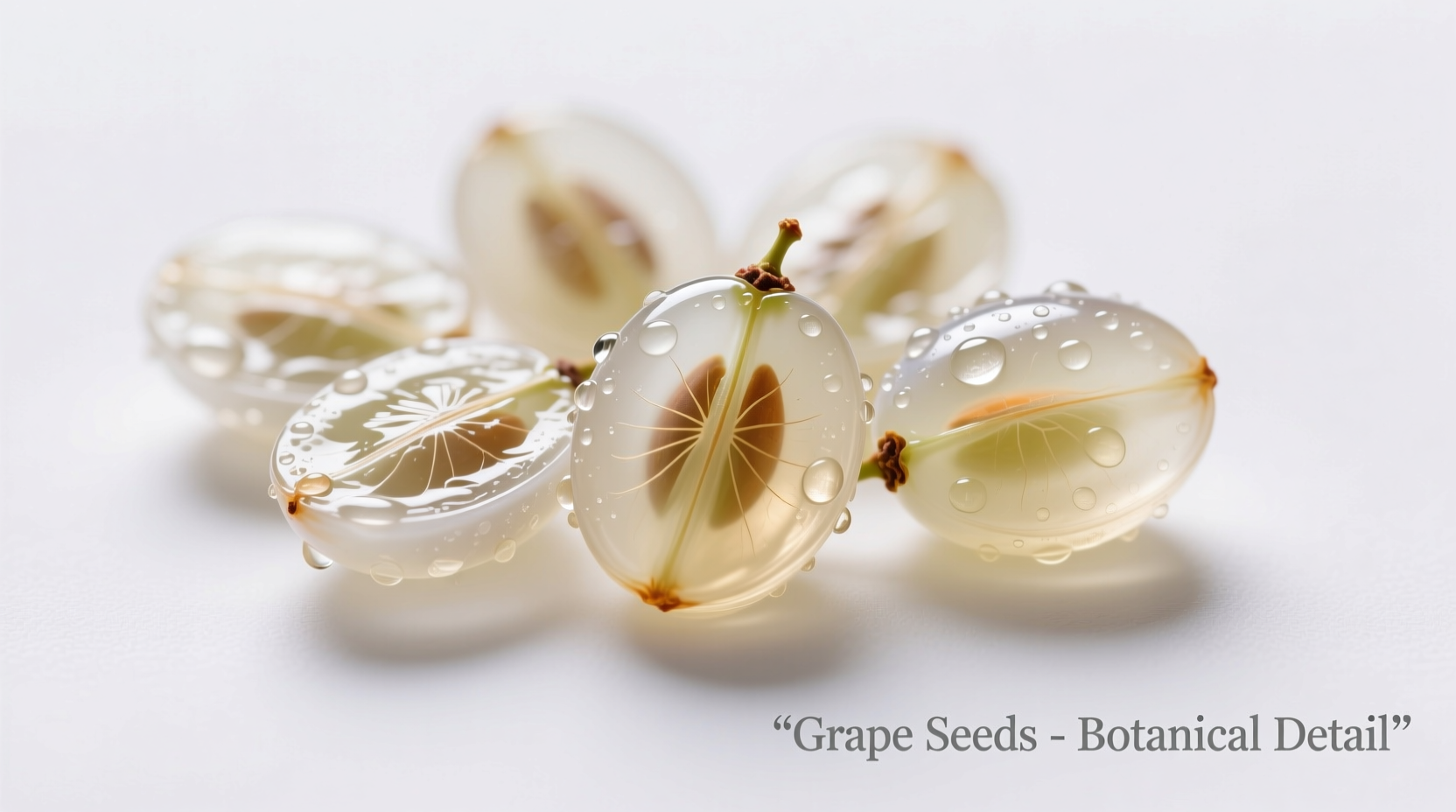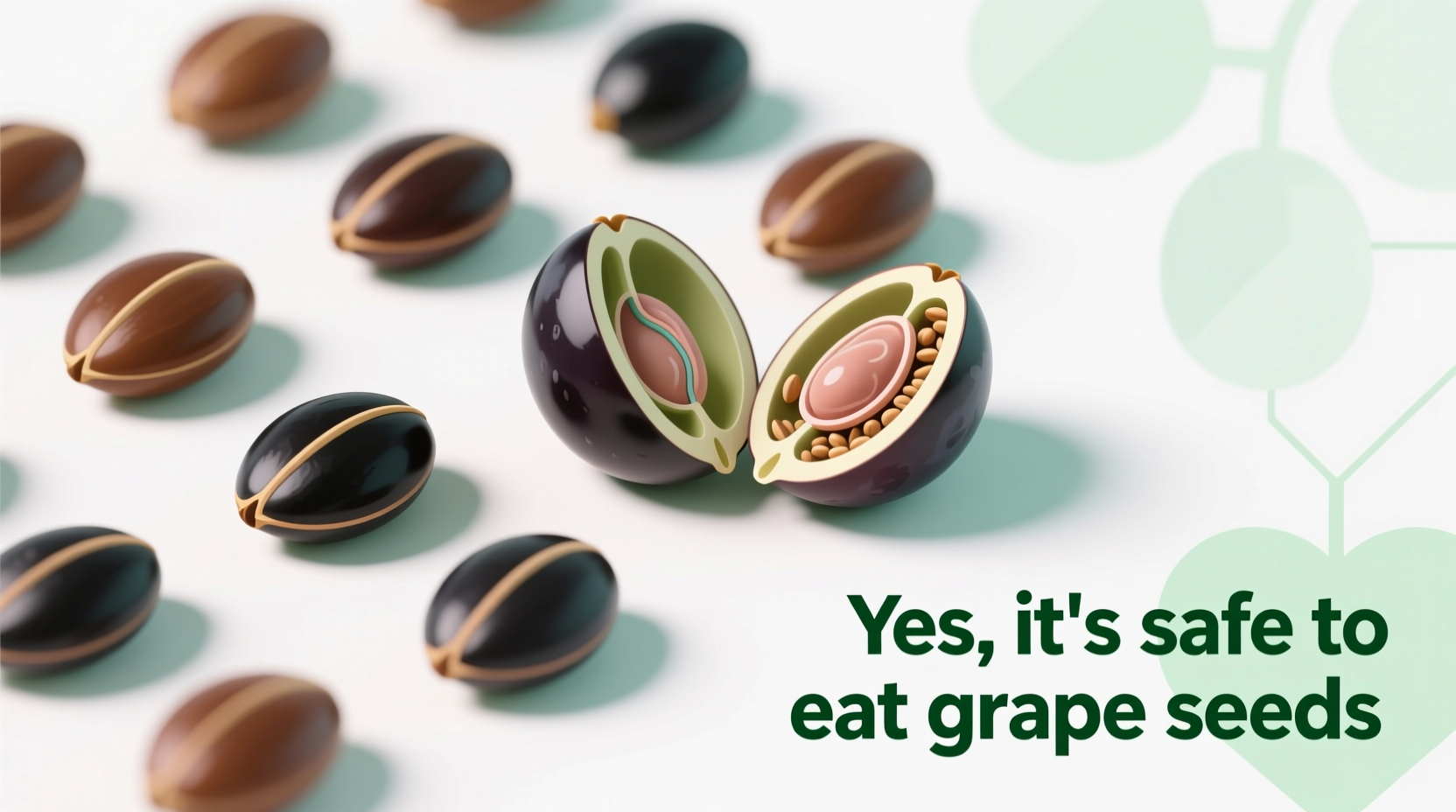What You Need to Know About Eating Grape Seeds
When enjoying a bunch of grapes, you've probably wondered whether to spit out those tiny seeds or swallow them. The straightforward answer is yes—it's perfectly safe for most people to eat grape seeds. Unlike some fruit pits that contain harmful compounds, grape seeds pose no significant health risks when consumed in normal quantities from fresh grapes.
Grape seeds actually contain valuable nutrients, including dietary fiber and powerful antioxidants called proanthocyanidins. These compounds have been studied for their potential health benefits, from supporting cardiovascular health to providing anti-inflammatory effects. According to research published in the Journal of Agricultural and Food Chemistry, grape seeds contain higher concentrations of certain antioxidants than the grape flesh or skin.
Understanding Grape Seed Composition
Grape seeds consist primarily of fiber, healthy fats, and bioactive compounds. While they're small, they pack a nutritional punch that many people unknowingly discard.
| Nutrient | Grape Seeds (per 100g) | Comparison to Grape Flesh |
|---|---|---|
| Dietary Fiber | 38g | 10x higher |
| Proanthocyanidins | High concentration | 5-10x higher |
| Vitamin E | Significant amount | Higher |
| Healthy Fats | Linoleic acid present | N/A |
This nutritional profile explains why some health-conscious eaters intentionally consume grape seeds rather than discarding them. The USDA FoodData Central database confirms that grape seeds contain valuable phytochemicals that contribute to their potential health benefits.

Practical Considerations for Grape Seed Consumption
While grape seeds are safe to eat, there are some practical considerations to keep in mind based on your individual circumstances:
Digestive Sensitivity Factors
Some people with sensitive digestive systems might experience mild discomfort when consuming grape seeds regularly. This is primarily due to their high fiber content and hard texture. If you have conditions like irritable bowel syndrome (IBS) or inflammatory bowel disease (IBD), you may want to monitor your body's response.
Context Boundaries: Who Should Be Cautious
Certain individuals should exercise caution with grape seeds:
- People with diverticulitis: While recent research has challenged the old recommendation to avoid seeds, some healthcare providers still suggest caution during flare-ups
- Those taking blood thinners: Grape seed compounds may interact with medications like warfarin
- Individuals with known seed sensitivities: Though rare, some people may have specific reactions
Grape Seeds vs. Grape Seed Extract: Important Distinctions
It's crucial to distinguish between eating whole grape seeds and taking grape seed extract supplements. The concentrated compounds in supplements can have different effects than the naturally occurring amounts in seeds.
According to the National Institutes of Health Office of Dietary Supplements, grape seed extract contains much higher concentrations of active compounds than what you'd get from eating seeds. While eating grape seeds from fresh grapes is generally safe, high-dose supplements may cause side effects like headache, dizziness, or allergic reactions in some individuals.
How to Incorporate Grape Seeds Into Your Diet
If you decide to eat grape seeds, here are practical ways to maximize benefits while minimizing potential discomfort:
- Chew thoroughly: Proper chewing breaks down the hard outer shell, making nutrients more accessible
- Start with small amounts: If new to eating seeds, begin with just a few grapes' worth to assess tolerance
- Pair with other foods: Consuming seeds with other foods can help prevent digestive upset
- Choose seed-containing varieties: Thompson Seedless grapes won't provide this option, but many red and purple varieties do contain edible seeds
Historical Perspective on Grape Seed Consumption
Grape seeds have been part of human consumption for thousands of years, though their nutritional value wasn't scientifically understood until recently:
- Ancient times: Early wine makers likely consumed seeds along with grape pulp
- Middle Ages: Grape seeds were sometimes used in traditional medicine preparations
- 20th century: Scientific research began identifying beneficial compounds in grape seeds
- Modern era: Grape seed extract became popular as a dietary supplement
This historical timeline shows how our understanding of grape seeds has evolved from simple acceptance as part of the fruit to recognition of their specific health properties.
Expert Recommendations
Nutrition professionals generally agree that eating grape seeds is safe and potentially beneficial for most people. The Academy of Nutrition and Dietetics notes that consuming whole plant components, including seeds, typically provides more nutritional benefits than removing them.
However, they also emphasize that grape seeds shouldn't be considered a miracle food. As with any dietary component, moderation is key. The small amount of seeds you'd consume from eating grapes as part of a balanced diet poses no risk for the vast majority of people.
Common Questions About Grape Seeds
Let's address some frequently asked questions about eating grape seeds:
Do grape seeds contain harmful toxins?
No, grape seeds do not contain harmful toxins. Unlike some fruit pits (such as apple seeds which contain amygdalin), grape seeds are safe to consume. They contain beneficial compounds like proanthocyanidins rather than harmful substances.
Can eating grape seeds improve heart health?
Research suggests the antioxidants in grape seeds may support cardiovascular health by helping maintain healthy blood pressure and improving blood vessel function. However, these benefits come from regular consumption as part of a balanced diet, not from occasional seed eating.
Are grape seeds difficult to digest?
For most people, grape seeds are easily digested when chewed properly. Some individuals with sensitive digestive systems might experience mild discomfort due to the fiber content, but this is uncommon with normal consumption amounts from fresh grapes.
Should children eat grape seeds?
Yes, children can safely eat grape seeds, but supervision is recommended for young children who might not chew thoroughly. The seeds pose minimal choking risk due to their small size, but proper chewing ensures both safety and better nutrient absorption.
Do grape seeds have any nutritional value?
Yes, grape seeds contain valuable nutrients including dietary fiber, healthy fats (particularly linoleic acid), vitamin E, and powerful antioxidants called proanthocyanidins. These compounds have been studied for potential anti-inflammatory and cardiovascular benefits.











 浙公网安备
33010002000092号
浙公网安备
33010002000092号 浙B2-20120091-4
浙B2-20120091-4